The Carceral City: Slavery and the Making of Mass Incarceration in New Orleans, 1803-1930

The Carceral City: Slavery and the Making of Mass Incarceration in New Orleans, 1803-1930
With powerful and evocative prose, Bardes boldly reinterprets relations between slavery and prison development in American history. Racialized policing and mass incarceration are among the gravest moral crises of our age, but these crises are not new: slavery, the prison, and race are deeply interwoven into the history of American governance.
PRP: 335.52 Lei
Acesta este Prețul Recomandat de Producător. Prețul de vânzare al produsului este afișat mai jos.
268.42Lei
268.42Lei
335.52 LeiLivrare in 2-4 saptamani
Descrierea produsului
With powerful and evocative prose, Bardes boldly reinterprets relations between slavery and prison development in American history. Racialized policing and mass incarceration are among the gravest moral crises of our age, but these crises are not new: slavery, the prison, and race are deeply interwoven into the history of American governance.
Detaliile produsului









